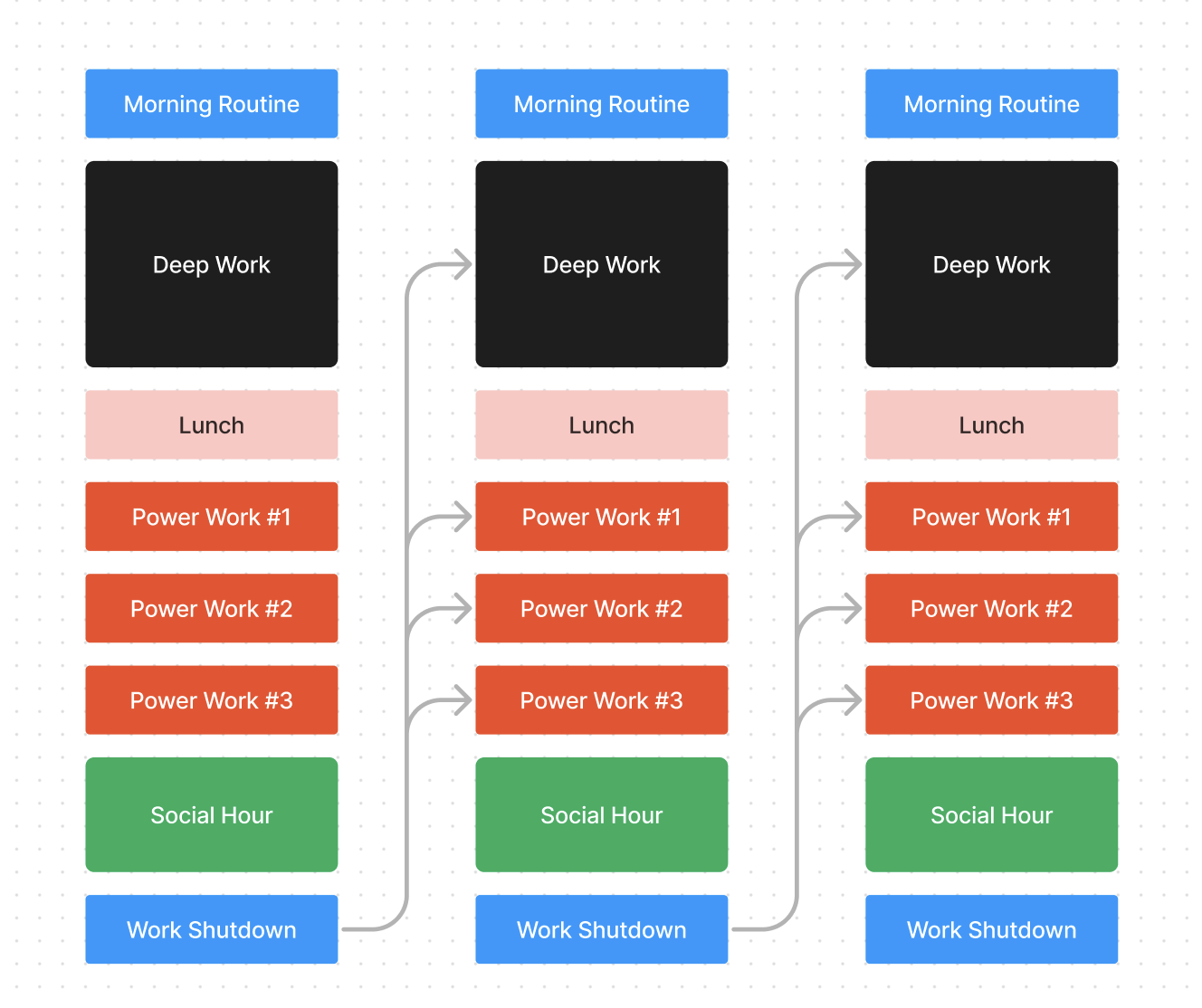Letting Now Jakob make decisions for Future Jakob
I’ve always been torn between my desire to allow spontaneity and my repeated observation that intentionality is essential.
I’ve tried many times to give my days more structure but always felt as if I’m building a prison for myself.
If your whole day consists of 25-minute Pomodoros there is zero room to ever enter flow state.
Freely following my curiosity, going down random rabbit holes, building prototypes, tinkering, is incredibly fun.
There is some truth to the observation that inspiration is perishable and it hence makes sense to act on it immediately.
Also acting with a sense of urgency, cultivating a Now Habit, you know, simply getting stuff done, helps a lot for keeping the momentum up in a business.
But at the same time, I see everyone who is acting with little intentionality stuck in the same place for years.
If you’re always deciding right there in the moment what to do, you’re basically running around like a headless chicken.
You’re never getting anywhere.
And you leave most territory unexplored because you never feel like going there.
Shiny object syndrome and the Resistance will be the forces governing your life.
One thing seems undeniably true to me:
Good things do not simply happen. You have to make them happen.
Progress in any area of your life requires intentionality.
But there must be room for spontaneity, agendaless exploration, flow.
The solution I’ve found is to create an intentionality-spontaneity barbell.
On one end of the barbell, I’ve implemented a lot of structure and habits to make sure I’m acting with intention.
These include monthly reviews, weekly reviews, and a highly structured daily routine.
But within this scaffolding, there is well-defined room for spontaneity, urgent tasks, and exploration.
Every morning I have a big block of time dedicated to “deep work” where I have plenty of time and space to get into flow state, tinker, and go down rabbit holes.
Every afternoon I have “power work” blocks, where I’m setting Pomodoro timers and simply get stuff done.
Now none of this is of course revolutionary.
However, I found there is one key to making this work.
I’m deciding on the topics to explore, the projects to work on, the tasks to do during these blocks 24 hours in advance.
At the end of each day, I decide what I will do during tomorrow’s deep work block and power work sessions.
“Now Jakob” tends to make poor decisions when it comes to the stuff he should be working on.
He likes avoiding anything remotely uncomfortable.
But he tends to make great decisions for “Future Jakob”.
It’s the same effect as when you’re able to see things so much more clearly for other people.
So “Now Jakob” can simply show up, and see that the goal during today’s deep work session is to think about X or to try improving Y by tinkering with different approaches.
“Now Jakob” loves doing that. It doesn’t feel like a prison at all.
Having this kind of clarity on what to work on is amazing.
Similarly during “power work” blocks he can simply look at the list of tasks and plow through them.
Getting stuff done is fun.
It’s incredible how much you can get done in only 25 minutes if you don’t waste any time wondering what to do or questioning whether what you work on is really the best use of your time.
There are of course some instances where a 24-hour delay is not quite optimal. A situation with a customer might require a fast solution. Team members need to be unblocked.
My current solution is that I schedule during one “power work” block a task like “look at Slack messages and emails and do everything you can do immediately”.
This allows me to address urgent issues quickly without getting sidetracked from my main priorities. For anything that requires more than a few minutes, I simply add it to my task list for the next day.

This system works well for me.
It provides a great balance between intentionality and spontaneity, between structure and freedom.
I’m able to make consistent progress on my long-term goals while still having plenty of room for exploration and serendipity.
This approach also works well for deciding what content to consume.
When I let “Now Jakob” decide, tends to waste hours scrolling on Twitter, reading mediocre blog posts, and listening to fluffy podcasts.
But when I ask him to pick content to consume for “Future Jakob”, his choices tend to be great.
I add the books, essays, and podcasts he picks to my “Tomorrow” page in Roam the same way I add tasks.
Then I’m only consuming this content and nothing else.
When I come across an article, podcast, or book that seems interesting, for example, during my research in a deep work session, I add it to Matter and decide later if it’s really worth dedicating time to it.
“Now Jakob” tends to make poor decisions for “Now Jakob” but makes great decisions for “Future Jakob”.
That’s the gist of it.
The more often I can add friction in the form of a time delay, the better.
An important final note here is that I tried to make this work by planning my day in the morning.
This did not work well for me.
Not having the night between “Now Jakob” and “Future Jakob” makes it much harder to view them as genuinely different people and make good decisions.
The temptation to make decisions based on immediate desires is too strong.
By planning the night before, there’s a clear separation, allowing for more objective decision-making.
PS: If you're interested in following my journey, sign up below:
